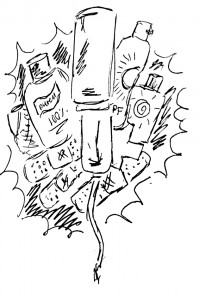Feminine care should be free at USC
A quick conversation with a Resident Assistant will reveal just how many health-related items students can receive for free. Amenities include sunscreens, hand sanitizers and condoms, among other useful products, to support the wellness of the USC community. But disappointingly, one thing remains hidden from the list — feminine hygiene products.
Across the United States, women are being taxed for being women. In an overwhelming 40 states, feminine hygiene products are considered luxury items. California is one of these states. Assemblywoman Cristina Garcia recently presented a bill to end this so-called tampon tax, citing in a press release that it costs women $7 a month for a span of 40 years simply to manage inevitable biological processes. Needless to say, women spend excessive amounts of money buying feminine hygiene products during their lifetimes. Not to mention, other products associated with menstruation, such as pain-relieving medication, heating pads and birth control, add significantly to the cost as well.
With students already shouldering the financial burden of the inflated cost of living in Los Angeles on top of continuous increases in the University’s already costly tuition, it is unfair to force female students to pay an even bigger price tag for circumstances outside of their control. Denying female students free access to feminine hygiene products in campus housing and university restrooms sends the message that these products are not essential. This essentially perpetuates society’s stigmatization of menstruation. If women need feminine hygiene products, they have to go elsewhere. This continues the trend of women hiding or being ashamed of their menstruation due to stereotypes surrounding the effect it has on women’s behavior. By failing to make the products used during menstruation easily accessible, the process is further seen as unnatural or something that has no place on the University grounds.
This is intensely problematic. Without proper feminine hygiene products, female students would find their classroom experiences severely impeded for one week of every month. Lack of access to these products doesn’t just make college more expensive for female students, but could also potentially jeopardize the education they are receiving.
Each semester, female students spend between three and five weeks per semester menstruating. That is anywhere from 20 to 30 percent of each semester. The rate of one tampon or pad change every six hours translates to 28 per week, or up to 140 per semester. This is just the minimum requirement to cope with the demands of menstruation. Feminine hygiene products are not a luxury. By not offering free access, the University is ignoring a common experience of more than half of its student body.
Instead, USC should look to examples led by efforts across the United States that are focused on integrating free access to tampons and sanitary pads in public spaces. Earlier last month in New York City, members of the city council initiated a pilot program in Queens in which a high school bathroom was supplied with unrestricted access to tampons and pads. The project is due to expand to 25 other schools in the area. Of the program’s mission, Councilwoman Julissa Ferreras-Copeland, the leader of the initiative, said, “You don’t ration toilet paper or ask for permission for more toilet paper. You shouldn’t have to for these products.”
By offering students free and unlimited access to feminine hygiene products, the University will be taking a stand both against the stigma of menstruation and for a more gender-equal, inclusive campus environment. Female students should not have to feel as if taking care of their normal biological processes is a luxury, and the University should not treat it as such.
All university restrooms on campus should be equipped with free feminine hygiene products, but at the very least, they should be more readily available. The University owes that courtesy to its female population. It is not a luxury — it is a basic human right.
Daily Trojan Spring 2016 Editorial Board


Honey, did your Daddy ever ask you why tuition goes up every year?
Paula Swinford, Director of the Office for Wellness and Health Promotion would like
you to know…
In room 203 of the Engemann Student Health Center, feminine hygiene products are as free as the sunscreen, ear plugs, bike lights, and sleep masks, etc. They many not be paid-for or taxed
out-of-pocket as a consumable commodity, but they are all paid for through a small portion of the Student Health and Wellness Fee. This semesterly Fee provides support for enhancing population health, so every student may know wellness in person, place, and planet.
Suggestions for other supplies anyways welcome, contact [email protected]. Thank you. Paula